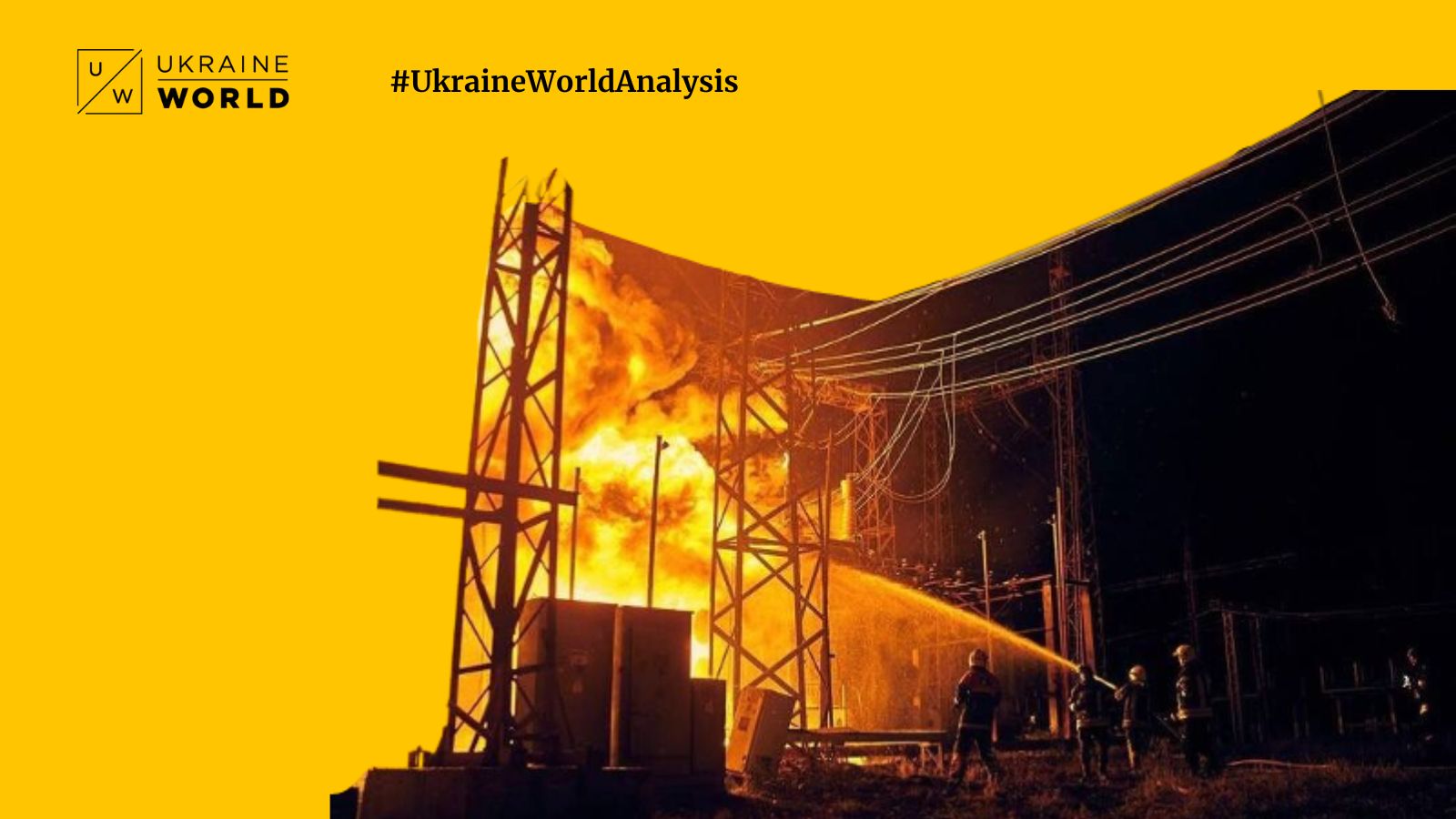UkraineWorld spoke to Dmytro Sniehyrov, military expert, co-chairman of the public initiative Prava Sprava.
Key points — in our brief, #UkraineWorldAnalysis:
1. On Putin's intention to plunge Europe into a dark winter
- The Russian Federation is trying to exert economic and political pressure on Ukraine and other European countries. European countries were able to diversify their income and reduce their dependence on Russian gas during the heating season due supplies of electricity from Ukraine.
- Ukraine's support is essential. Russia plans to block this possibility. It is no coincidence that after October 11, Ukraine announced a temporary suspension of Ukraine's electricity exports to Europe.
2. On the missile attacks as a premeditated action and the Crimean bridge narrative
- According to Ukraine's Main Intelligence Directorate, Russia's missile attacks on October 10-11 were in no way connected to the events which took place on the Crimean bridge or the appointment of General Sergei Surovikin as the new commander-in-chief of the Russian troops in Ukraine.
- On October 5, OPEC countries, in particular Saudi Arabia and the Russian Federation, made an unprecedented decision to slash oil production by 2 million barrels per day. This was a serious blow to European countries. Russia laid the foundations for political and economic pressure on European countries in order to force them to resume receiving gas through the North Stream pipelines and to prevent Europe from diversifying its gas supply in order to have a normal heating season (since oil and gas prices are closely linked, cuts in oil production to push prices higher will also have the effect of spiking gas prices).
- Thus, it is clear that this decision was not taken in a single day, and had been in the works for over a month. This has been a long-term process, the next step of which was launching missile strikes on Ukrainian energy infrastructure.
- At the same time, Russia has shut down the Zaporizhzhia NPP, which provides about 25-34% of Ukraine's total electric power generation. That is, Russia's actions are a matter of destabilizing the domestic Ukrainian market, spreading panic in Ukrainian society, and preventing Ukraine from providing its planned electricity exports. This set of actions shows that Russia's strikes on energy infrastructure have been no accident.
3. On the capacity of the EU to implement collective decisions
- It is an open question whether EU countries will be able to carry out their collective decision to regulate prices for Russian energy carriers. In fact, the EU faces a dilemma: OPEC countries have reduced oil production and thus limited Europe's ability to diversify supplies while on the other hand, Ukrainian electricity exports have also become unavailable.
- The implementation of decisions on limiting prices for Russian energy carriers remains in question. Russia has used the situation on the Crimean bridge to whitewash its own missile terrorism.
4. On prospects for the heating season
- The internal situation is stable. We are now talking about the heating season in European countries. It was no accident that the attacks were concentrated around the Burshtyn Power Plant, which provides energy deliveries to EU countries. We have synchronized work with a European supplier. The same is the case with the Ladyzhynska Power Plant.
- It should not be forgotten that electricity sales provide about 4 billion hryvnias to the budget. Russia's operation was coordinated against multiple targets and planned well in advance. Therefore, the European heating season is in danger, since we cannot guarantee the cessation of bombardments against our energy infrastructure.
- The Russian Federation's share of the gas market as of 2021 was up to 32%. There was a certain inconsistency of actions with other gas suppliers on the European hub, primarily Algeria and Norway, which did not make preparations to increase gas production on the European market in order to delay fluctuations. Moreover, European countries at one time pushed the idea of creating an Investigative Group.
- Currently, Germany's energy security is ensured through the construction of terminals for liquefied gas from the USA. The possibility of deconserving gas fields on the territory of the European continent is also being considered, primarily the Netherlands.
5. On the aftermath of the energy infrastructure strikes
- It is no coincidence that after the attacks on Ukrainian energy infrastructure, a meeting between Erdogan and Putin took place, where the possibility of reaching peace agreements between Russia and Ukraine was discussed. This is another element of Russia's plans to press Europe and Ukraine into bending before Russian demands and surrendering Ukrainian sovereignty and territory.
- The sabotage of the Nord Stream pipelines is part of this unified operation. At the same time, it is not clear why it was necessary to blow up Nord Stream-2, since it is not currently functioning. Since August 30, the Russian Federation has not been pumping gas through Nord Stream-1. By blocking deliveries through sabotage rather than by ceasing them in violation of agreements, Russia is trying to damage European energy security while avoiding the fines it would otherwise incur. Russian warnings about "terrorist attacks" on the Turkish Stream gas pipelinesare not accidental, either. Russia is trying to increase pumping through Turkey, which has increased gas flows through these pipelines by 30% in recent months.
- Turkey is trying to win maximum economic benefits from the current situation. Erdogan has positioned himself as a regional leader, so any diplomatic successes could boost his flagging approval ratings amidst Turkey's economic failures. Turkey has asked the Russian Federation to allow it to postpone paying for the gas supplied to it, as inflation in Turkey has surged to 70%. Erdogan is also building his own military-political project in Africa. Ukraine should not expect unconditional support from him.
This material was prepared with financial support from the International Renaissance Foundation.
DARIA SYNHAIEVSKA, ANALYST AND JOURNALIST AT UKRAINEWORLD
Dmytro Sniehyrov, military expert, co-chairman of the public initiative Prava Sprava

